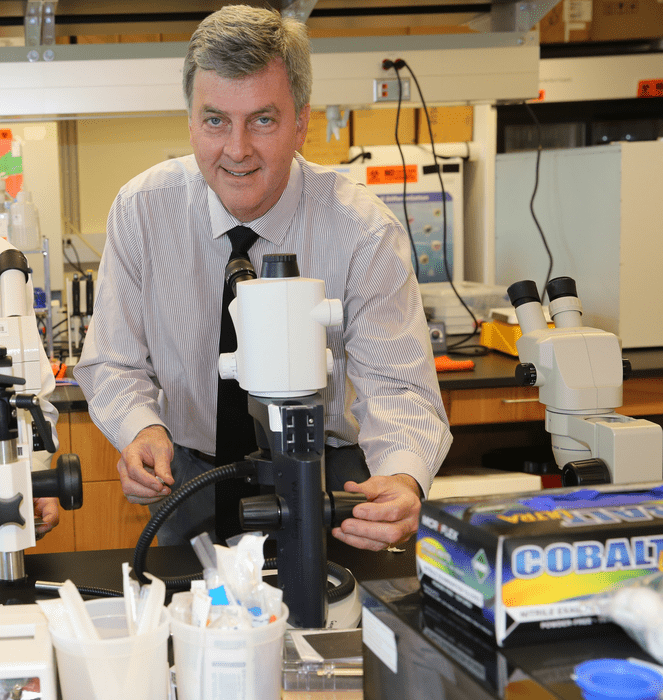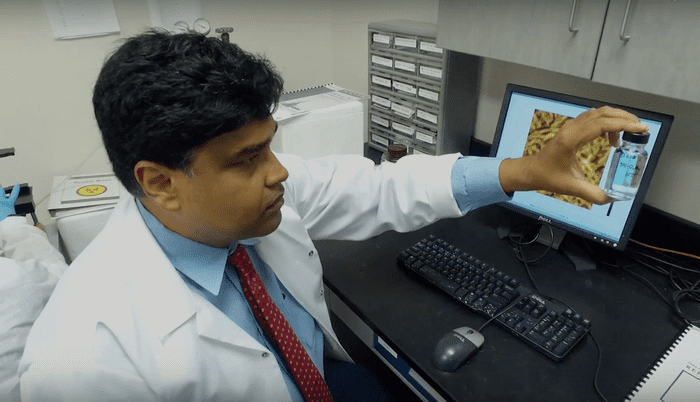Long-lasting disinfectant shows promise for fight against pandemics and hospital-acquired infections
University of Central Florida researchers have developed a nanoparticle-based disinfectant that can continuously kill pathogens on a surface for up to seven days – a discovery that could be a powerful weapon against COVID-19 and other emerging pathogenic viruses.
Christina Drake, a UCF alumna and founder of Kismet Technologies, was inspired to develop the disinfectant after making a trip to the grocery store in the early days of the pandemic. There she saw a worker spraying disinfectant on a refrigerator handle, then wiping off the spray immediately.
“Initially my thought was to develop a fast-acting disinfectant,” she said, “but we spoke to consumers – like doctors and dentists – to find out what they really wanted from a disinfectant. What mattered the most to them was something long-lasting that would continue to disinfect high-touch areas like doorhandles and floors long after application.”
Drake partnered with Dr. Sudipta Seal, a UCF materials engineer and nanosciences expert, and Dr. Griff Parks, a College of Medicine virologist who is also associate dean of research and director of the Burnett School of Biomedical Sciences. With funding from the National Science Foundation, Kismet Tech and the Florida High Tech Corridor, the researchers created a nanoparticle-engineered disinfectant.
Most disinfecting wipes or sprays will disinfect a surface within three to six minutes of application but have no residual effects. This means surfaces need to be wiped down repeatedly to stay clean from a number of viruses like COVID-19. The nanoparticle formulation maintains its ability to inactivate microbes and continues to disinfect a surface for up to seven days after a single application.

Credit: University of Central Florida
“The disinfectant has shown tremendous antiviral activity against seven different viruses,” explained Parks, whose lab was responsible for testing the formulation against “a dictionary” of viruses. “Not only did it show antiviral properties toward coronavirus and rhinovirus, but it also proved effective against a wide range of other viruses with different structures and complexities. We are hopeful that with this amazing range of killing capacity, this disinfectant will also be a highly effective tool against other new emerging viruses.”
The scientists are confident the solution will have a major impact in health care settings, in particular, reducing the rate of hospital acquired infections – such as Methicillin-resistant Staphylococcus aureus (MRSA), Pseudomonas aeruginosa and Clostridium difficile – which cause infections that affect more than one in 30 patients admitted to U.S. hospitals.
And unlike many commercial disinfectants, the formulation has no harmful chemicals, which indicates it will be safe to use on any surface. Regulatory testing for irritancy on skin and eye cells, as required by the U.S. Environmental Protection Agency, showed no harmful effects.
“Many household disinfectants currently available contain chemicals that can be harmful to the body with repeated exposure,” Drake said. “Our nanoparticle-based product will have a high safety rating will play a major role in reducing overall chemical exposure for humans.”
More research is needed before the product can go to market, which is why the next phase of the study will look at how the disinfectant performs outside of the lab in real world applications. That work will look at how the disinfectant is affected by external factors such as temperature or sunlight. The team is in talks with a local hospital network to test the product in their facilities. “We’re also exploring developing a semi-permanent film to see if we can coat and seal a hospital floor or door handles, areas where you need things to be disinfected and even with aggressive and persistent contact,” Drake added.
Metal-Mediated Nanoscale Cerium Oxide Inactivates Human Coronavirus and Rhinovirus by Surface Disruption. ACS Nano, 26 August 2021.


